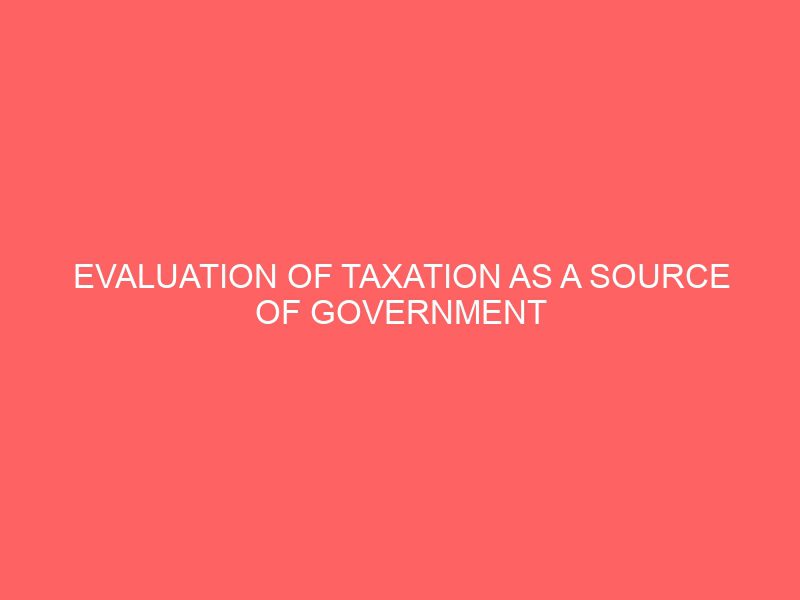Description
EVALUATION OF TAXATION AS A SOURCE OF GOVERNMENT REVENUE; A CASE STUDY OF THE STATE BOARD OF INTERNAL REVENUE
- ABSTRACT
The Nigeria tax system had its share in terms of being adequately mobilized for an increased revenue and fiscal actions. The State tax revenue is no exemption or Exception to the fact that the revenue generating ability is grossly inadequate to meet up its government functions.
Taxation which is seen as compulsory payment made by the citizens of an entity (country) to the government is mis-constructed in terms, of what the government tax Agencies actually realizes from it.
The term “Taxation” as a source of Government revenue with special reference on the states tax revenue sources, is seen in this study as a lopsided mobilization effort in some states, used as a case study. The research carried out, using the ratio analysis and the difference equation evidently pointed out the fact that some states likes Lagos, Anambra etc. is able to mobilized. A sizeable pool of revenue with recourse to depending on the federal government.
Thus, it is suffix to say here that while some states are reaping a large share of revenue from tax some others are not able to able to meet up the challenges of tax collection either due to poor tax administration, lack of proper orientation to the indigenes on tax payments or inadequate commercial and industrial development in the states affected.
This study is enhanced because of the need to reappraise the tax system of each state, enlighten the supposed tax payers, give concessions. When aftermath of taxation the proceed of the aftermath of taxation into feasible developmental use and Re-Organise the tax Administration system of the states, to foster a move efficient and effective tax mobilization efforts of states.
TABLE OF CONTENTS
Title page
Approval page
Dedication
Acknowledgement
Abstract
Table of contents
CHAPTER ONE
1.0 Introduction
1.1 Objectives of the study
1.2 Significance of study
1.3 Scope and limitation of study
1.4 Terminologies in study
CHAPTER TWO
2.0 Background of the study
2.1 Principles of taxation in Nigeria
2.2 Theory of tax structure development in Nigeria
2.3 Administration of tax structure
2.4 Functions of a good tax system and Administration in Nigeria
2.5 Divisions of taxing power to state under the Nigeria constitutions
2.6 Analysis into the State Government tax revenues
2.7 Rights of the State tax boards and the tax payers
2.8 Economic effect of State Government’s tax and it’s
implication on the government.
CHAPTER THREE
3.0 Summary of finding, Conclusion and Recommendation
3.1 Summary of findings
3.2 Conclusion
3.3 Recommendation
Bibliography
CHAPTER ONE
1.0 INTRODUCTION
Taxation can simply be seen as a compulsory transfer or payment (or occasionally of goods and service) from private individuals, Institutions or groups to the government, Anyanwu, (1998). It is a burden which every citizen must bear to sustain his or her government.
Another perspective of the definition has it that, taxation is the compulsory payment levied by the government on its citizens to generate revenue and control economic activities, hence it is backed by law. Taxation has not only influenced the economy, it has also become an important instrument of economic policy.
Thus its importance lies primarily in its ability to raise capital formation of the public sector for the development and growth of the economy. Its regulatory roles of consumption and hence of stabilization as well as of income redistribution are accordingly derivatives of the primary to provide service for the community, whether to the individuals families or the wider community. Additional to their service role, however, most public service organizations under the State Government can that including seeking a profit or contribution on that trade, and or they can make charge for some or all of their services. But since profit is not the main essence of these (corporations) establishments, taxation happens to be one of the avenue through which these corporations make up for administration expenses and revenue.
The government has certain functions to perform for the benefits of those, it governs. The scope of these functions will depend, among other things, on the particular and economic orientation of the members of a particular society at a given point in time, Their needs and aspirations and their willingness and ability to pay tax. As the functions of the government increase, the revenue of financing those functions must necessarily increase.
Nigeria operates a federal system of government which allows the division of powers among different (3) tiers of government which includes the federal, State and Local Government.
In all the ability to differentiate or divide the taxing power of these tiers seems simple enough when it comes to the terms of starting the various types of taxes that are available within this various tiers. But for the course of this study the various types of taxes levies collected by the State Government includes:








Reviews
There are no reviews yet.